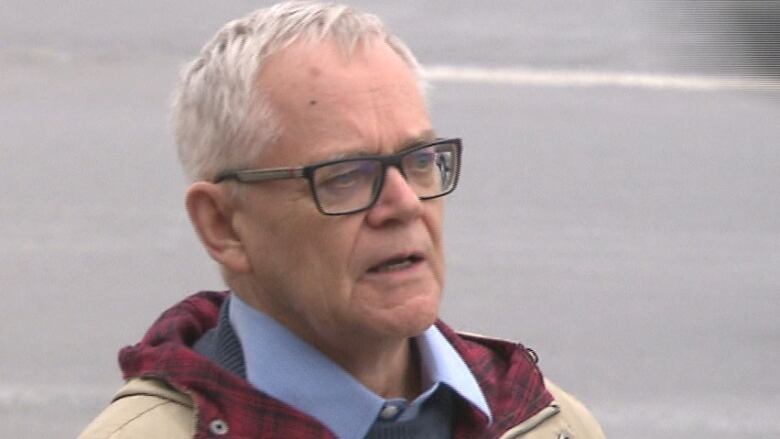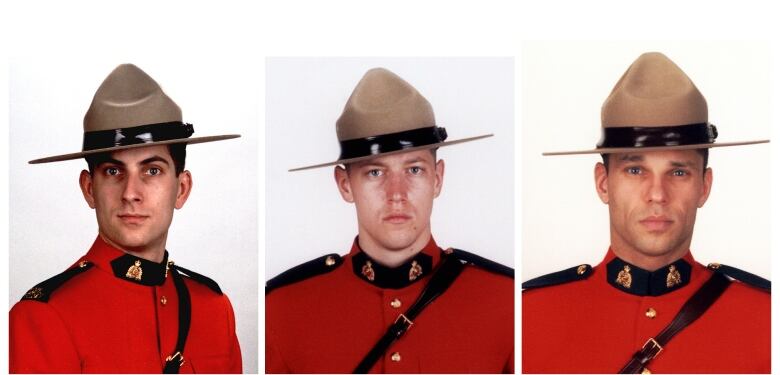Ex-senior RCMP officer testifies to frustration over delay approving carbines
Force's trial on labour code charges in Moncton Mountie shootings hears of urgent need for better weapons

A former senior RCMP officer testified Tuesday he was frustrated in 2010 with how longthe national police force was taking to adopt patrol carbines and ordered work to that end to proceed, even before the decision was officially made by the senior executive committee.
Rod Knecht, who was the senior deputy commissioner in Ottawa at the time, said he believed it was urgent to get better weapons for frontline officers following the shooting deaths of four Mounties inMayerthorpe,Alta., in 2005.
In my mind, it was a pretty easy decision.- RodKnecht, former RCMP senior deputy commissioner
"I felt there was no need to delay it any further," said Knecht, who approved research be conducted toidentify the best model of the semi-automaticweapon in early 2011.
"In my mind, it was a pretty easy decision.
He said he knew the actual implementation would likely take 12 to 18 months, in part because of financialconstraints and training requirements.
"I was pretty comfortable with my decision," he toldtheRCMP'strial on charges of violating health and safety provisions of the Canada Labour Code in connection with the shooting deaths of threeMonctonMounties and wounding of two others in 2014.
Mayerthorpefatalities had lasting impact
Knecht, who is now chief of the Edmonton Police Service, said he was "not a big supporter of the carbines initially." He had concerns about using such high-powered weapons in urban areas, he said.
"But I guess I became educated on the value of the carbine over time by talking to my colleagues" and through personal experience during his 40-year policing career.
He said he realized carbines, if used properly, were superior weapons to shotguns or pistols.
Carbines were a "topical issue from time to time" over the yearsbut "became more of a pressing issue post-Mayerthorpe," he said.
Knechtis from Alberta and was the RCMP's second-in-commandthere during theMayerthorpeshootings, theMonctoncourtroom heard.
He said the events had a lasting impact on him andwhen he arrived at the national headquarters in Ottawa in 2010, he was determined to speed things along.
In early 2011, thejudge presiding at an inquiry into theMayerthorpeshooting deaths recommended theRCMPgive high priority to carbines.
Knechtleft his position of senior deputy commissionerat the end of May 2011. He was unaware of timelines or target dates forrolloutat thattime, he said.
Defence knocks consultant's report

MarkErtelargued theRCMPrejected Carleton University criminologyProf.DarrylDavies's recommendations because his report failed to meet expectations not because the force didn't believe in protecting its officers.
When the force signed a contract with Davies in April 2009, "it's obvious from the statement of work theRCMPwants to bring in carbines," Ertelsaid.
But Davies's report was largely anecdotal, rather than evidence-based, and he didn't follow what was outlined in his contract, according toErtel.
That's why more research was needed in subsequent years as part of the force's due diligence, Ertel suggested.
TheRCMPis accused of four health and safety violations under the CanadaLabourCode stemming from a shooting rampage by JustinBourquein June 2014 that saw threeMonctonMounties killed and two others wounded as he walked through aMonctonneighbourhood with a high-powered weapon.

Carbines have greater range and accuracy than the shotguns used byRCMP.
Crown prosecutor Paul Adamschallenged the defence lawyer's assertionsduring re-examination of Davies.
He said the criminologistworked closely with the RCMP'suse-of-force section for roughly a year and no one ever told him he should do things differently.
- RCMP told they needed carbines 'yesterday,' labour code trial in Monctonshootings hears
- Moncton RCMP did not have proper equipment or training, Crown tells labour code trial
- 6 different reports recommended carbines for frontline RCMP officers before adoption
Outside court, Davies told reportersit was only when Bob Paulson came in as assistant commissioner of theRCMPthat there was confusion about the expectations from the report.
"There's something that's wrong and it's called incompetence in theRCMP," said Davies.
"That they wouldn't know what reports they're dealing with, they wouldn't know what terms of reference they're using,I think it speaks to the arrogance, it speaks to the inertia and the apathy of senior managers, and the rank and file have a right to work in a safe environment."
Davies said he can't go as far as saying his report would have saved lives, but he's sure it would have started the debate over supplying officers with carbines four years before the fatal shootings inMoncton.
The charges against the RCMP are:
- Failing to provide RCMP members with appropriate use-of-force equipment and related user training when responding to an active threat or active shooter event.
- Failing to provide RCMPmembers with appropriate information, instruction and/or training to ensure their health and safety when responding to an active threat or active shooter event in an open environment.
- Failing to provide RCMP supervisory personnel with appropriate information, instruction and/or training to ensure the health and safety of RCMP members when responding to an active threat or active shooter event in an open environment.
- Failing to ensure the health and safety at work of every person employed by it, namely RCMP members, was protected.
Each charge carries a maximum fine of $1 million.
The trial, which started last week, resumes on Wednesday at 9:30 a.m. AT with the Crown's fifth witness.
With files from Gabrielle Fahmy












_(720p).jpg)


 OFFICIAL HD MUSIC VIDEO.jpg)
.jpg)



























































































